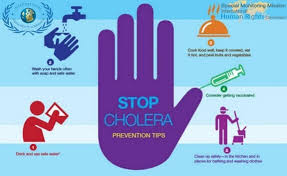
FG launches $124m cholera control initiative
In order to eradicate cholera in Nigeria using a multi-sectoral strategy, the Federal Government has started the National Strategic Plan of Action on Cholera Control 2025-2029, a $124 million project.
The strategy was presented in Abuja on Tuesday by Prof. Muhammad Pate, the Coordinating Minister of Health and Social Welfare.
Pate reaffirmed the government's dedication to cholera response, readiness, and prevention.
According to the News Agency of Nigeria, the launch event, which was organised in collaboration with the National Primary Health Care Development Agency, the Nigeria Centre for Disease Control and Prevention, and international health partners, was a major turning point in Nigeria's fight against cholera and protection of public health.
In his capacity as the Ministry's Permanent Secretary, Daju Kachallom, Pate emphasised the pressing necessity of a unified response to combat frequent outbreaks across the country.
He said the health ministry is working closely with other ministries and partners to implement this plan.
“The plan is built on key pillars such as leadership and coordination, surveillance, case management, cholera vaccination, Water, Sanitation, and Hygiene , as well as public awareness and research,” he said.
The minister stressed that eliminating cholera in Nigeria requires collaboration among government agencies, development partners, private sector actors, and local communities.
“Cholera has been eradicated in other parts of the world, why is it still affecting Nigeria? We must act collectively to change this reality,” he said.
He urged stakeholders to commit to the plan’s implementation and ensure that the country builds resilient health and sanitation systems to prevent future outbreaks.
In his remark, the Director-General of NCDC, Jide Idris noted that the NSPACC, led by the Ministries of Health, Water Resources, Sanitation, and Environment, aligned with the Global Task Force on Cholera Control and the Global Roadmap to Ending Cholera.
In order to eradicate cholera in Nigeria using a multi-sectoral strategy, the Federal Government has started the National Strategic Plan of Action on Cholera Control 2025-2029, a $124 million project.
The strategy was presented in Abuja on Tuesday by Prof. Muhammad Pate, the Coordinating Minister of Health and Social Welfare.
Pate reaffirmed the government's dedication to cholera response, readiness, and prevention.
According to the News Agency of Nigeria, the launch event, which was organised in collaboration with the National Primary Health Care Development Agency, the Nigeria Centre for Disease Control and Prevention, and international health partners, was a major turning point in Nigeria's fight against cholera and protection of public health.
In his capacity as the Ministry's Permanent Secretary, Daju Kachallom, Pate emphasised the pressing necessity of a unified response to combat frequent outbreaks across the country.
He said the health ministry is working closely with other ministries and partners to implement this plan.
“The plan is built on key pillars such as leadership and coordination, surveillance, case management, cholera vaccination, Water, Sanitation, and Hygiene , as well as public awareness and research,” he said.
The minister stressed that eliminating cholera in Nigeria requires collaboration among government agencies, development partners, private sector actors, and local communities.
"Why is cholera still a problem in Nigeria when it has been eradicated in other parts of the world? To alter this reality, we need to work together," he stated.
In order to stop future epidemics, he asked all parties involved to be dedicated to the plan's execution and make sure the nation develops robust health and sanitation systems.
NCDC Director-General Jide Idris stated in his statement that the NSPACC, which was headed by the Ministries of Environment, Sanitation, Water Resources, and Health, was in line with the Global Roadmap to Ending Cholera and the Global Task Force on Cholera Control.
Idris noted that although they only made up 17.7% of Nigeria's population, the plan identified 134 hotspot LGAs spread across 21 states, which were responsible for 71.1% of cholera cases and 65.6% of fatalities.
According to him, the plan's main initiatives include increasing the coverage of the oral cholera vaccine, bolstering epidemiological surveillance, expanding laboratory capacity, upgrading WASH infrastructure, and launching public awareness campaigns about cholera prevention.
According to him, the five-year plan called for $124 million, with an annual budget of $20 million, which would be mostly used for WASH programs, OCV programs, and laboratory services.
Through Permanent Secretary Richard Pheelangwah, Minister of Water Resources and Sanitation Joseph Utsev reiterated the ministry's dedication to increasing access to clean drinking water and enhancing sanitation to prevent cholera outbreaks.
The Minister of Environment, Balarabe Lawal, represented by Mahmud Kambari, emphasised the role of environmental health efforts in disease prevention, highlighting ongoing initiatives such as national sanitation programmes and environmental health surveillance.
NAN reports that the GTFCC launched the Ending Cholera: A Global Roadmap to 2030, aiming to reduce global cholera deaths by 90 per cent and eliminate the disease in at least 20 countries by 2030.
In response, Nigeria developed NSPACC to accelerate cholera control by 2029 through prevention, timely detection, and a multi-sectoral approach.
Following Nigeria’s commitment at the 71st and 75th World Health Assemblies, the Office of the Vice President was designated to coordinate the NSPACC and oversee the National Cholera Steering Committee.
By 2029, the plan seeks to cut the case fatality rate to less than 1% and cut cholera incidence and deaths by 90% annually.
The NSPACC was finished during workshops in 2022 and 2023 after being developed through multi-stakeholder engagements.
The strategy was finished at a Validation Workshop in June 2023 and approved by the GTFCC collaboration.
Leadership & Coordination, Surveillance, Laboratory Strengthening, Case Management, OCV, WASH, Risk Communication & Community Engagement, Logistics, and Research are the nine theme pillars that make up the NSPACC.
Stakeholders underlined that this launch reaffirms Nigeria's resolve to eradicate cholera via a well-funded, coordinated, and evidence-based strategy.





